
The world economy is experiencing a period of weak growth and “weak, uneven” recovery, evidence indicates the Index of economic recovery, compiled by Brookings Institution and Financial Times.
In anticipation of the spring meetings of the Directors of the IMF and world Bank, which will be held this week, the index recorded such factors as the extremely low investment activity, the decline in industrial production and declining business confidence worldwide.
The results of the index will be reflected in the IMF forecasts for the global economy Tuesday that forced the head of the IMF Christine Lagarde to warn of global risks along with too slow recovery and low growth of the economy. In 2016, the IMF intends to revise the growth forecast of 3.4%.
According to Brookings economist Professor Eswara Prasad fears the worst financial and economic crisis in January and February “can be justified, and this is after a rather sluggish growth in 2015. In 2016 the world economy expects a worrying prospect of the same situation”.
The IMF took a more pessimistic stance regarding the prospects of recent weeks. However, the Tiger index have recorded some stabilization after the sharp slowdown in the second half of last year.
The index compares data on the state of the economy of the countries “Big twenty”, financial markets and investor confidence with their historical averages in the world economy for each country. Now the indicators for emerging markets is much worse compared to historical values, despite the fact that in 2016, a decrease was not observed.
The indices of the Tiger (Tracking Indices for the Global Economic Recovery) shows how the indicators of real economic and business activity, financial markets and investor confidence relate to average historical data in the global economy and in individual countries.
In the advanced economies indicators, usually better, in this case, the growth rate does not exceed the long-term average, as confidence fell amid weak performance of the financial markets and fears of such upheavals as a potential British exit from the EU.
“If the government is unable and unwilling to reform and take aggressive policy measures to support growth, expected weak growth may unsettle,” said Prasad.
The most optimistic economic news lately come from the US, where indicators such as employment, retail sales and credit growth remain high, despite the shaken confidence of the business community.
Indicators of the Eurozone as a whole in 2016, slightly stronger than last year, although the amount of investment, retail sales and consumer confidence remain weak, raising concerns about the sustainability of recovery.
The UK economy is also “stood on his feet”, while investment, business confidence and industrial production, apparently, suffer from the uncertainty caused by the June referendum on EU membership.
From countries with developing economies, only China was able to resist the pressure of such problems as outflow of capital and devaluation faced by other countries at the beginning of the current year.
However, the Chinese authorities seek to stimulate economic growth, but it does not show special desire to implement market reforms, especially the reform of public sector enterprises in a period of weak growth, said Professor Prasad.
India, currently one of the fastest growing large economies, to maintain high business activity used the factor of low prices for resources, trying to divert attention from underlying structural imbalances and the decline in industrial production.
The good news for the global economy is that emerging economies have survived the initial rise in interest rates by the Federal reserve system of the United States without a major crisis.
However, despite this, the economy remains vulnerable to changes in external circumstances. Even a small recovery may be too fragile and fleeting.








